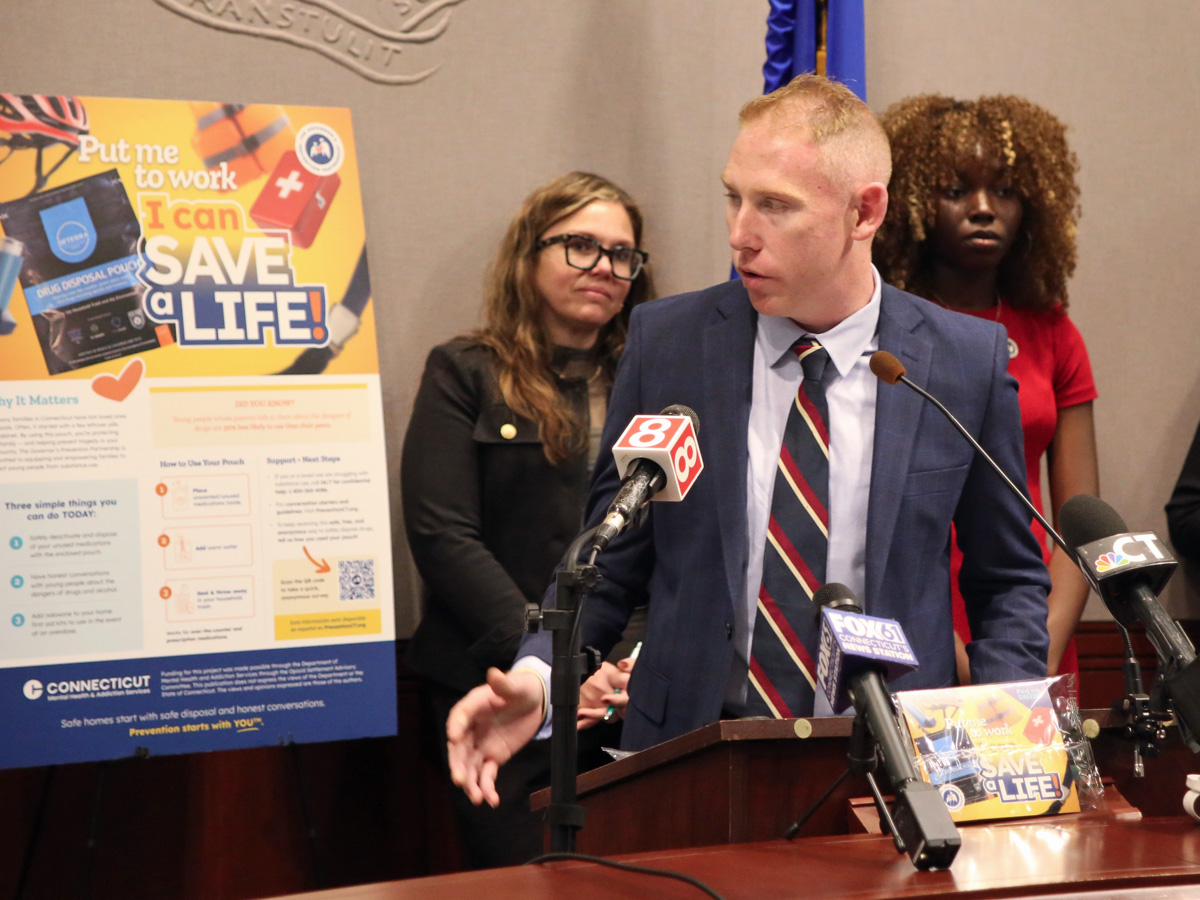Health
50,000 Drug Deactivation Kits Distributed in Connecticut’s Anti-Opioid Effort

Connecticut is set to distribute 50,000 Deterra drug deactivation pouches to households as part of an anti-opioid campaign coinciding with Red Ribbon Week, which runs from October 23 to October 31. The initiative aims to combat prescription drug misuse and is particularly focused on households with children. Governor Ned Lamont highlighted the importance of safe medication disposal during a media briefing, sharing his personal experience with unused opioids after undergoing hip surgery.
Governor Lamont recounted being offered opioid medication for post-surgical pain but ultimately declined it. He faced the issue of disposing of the leftover pills, aware of the environmental hazards associated with improper disposal methods like flushing them down the toilet. This common dilemma prompted state officials to launch the pouch distribution program, which is touted as an environmentally safe solution for disposing of unwanted medications.
The Deterra pouches are designed to deactivate both prescription and over-the-counter medications, including liquids, patches, and creams. Users simply place the unwanted substances into the pouch and add warm water, making the waste safe for disposal in regular trash. Kelly Juleson, co-president of the Governor’s Prevention Partnership, emphasized that the campaign is a collaborative effort involving state agencies, legislators, and prevention partners, all working towards the shared goal of safeguarding families.
Significant Impact Expected
The initiative is part of a broader prevention program funded through the Connecticut Department of Mental Health and Addiction Services, with a budget of $2 million allocated by the Opioid Settlement Advisory Committee. The state plans to distribute approximately 50,000 pouches annually until 2029. Juleson estimated that around 90% of recipients will utilize the pouches, often within the first 24 hours of receiving them. Previous distributions in Hartford and New Haven resulted in a notable 26% decrease in overdose cases, which Juleson described as significant.
Jason Sundby, CEO of Verde Technologies, the manufacturer of Deterra, projected that the program could help remove around 2 million pills from circulation each year. State Senator Stephen Harding of Brookfield remarked that initiatives like these position Connecticut as a leader in addressing the opioid crisis, emphasizing that the issue transcends political affiliations. “Every individual in the state, unfortunately, is touched by this crisis,” he stated.
Governor Lamont echoed this sentiment and underscored the need for preventive measures against prescription opioids such as fentanyl. He argued that addressing the demand for these substances is crucial in tackling drug addiction and preventing overdoses. “We’re not going to stop this by interdiction,” he said, emphasizing that proactive strategies are essential for long-term success.
This comprehensive approach to drug disposal and prevention during Red Ribbon Week reflects Connecticut’s commitment to tackling the opioid epidemic head-on, aiming not only to reduce the number of unused medications in homes but also to foster a culture of safety and responsibility among families.
-

 Business2 weeks ago
Business2 weeks agoIconic Sand Dollar Social Club Listed for $3 Million in Folly Beach
-

 Politics2 weeks ago
Politics2 weeks agoAfghan Refugee Detained by ICE After Asylum Hearing in New York
-

 Health2 weeks ago
Health2 weeks agoPeptilogics Secures $78 Million to Combat Prosthetic Joint Infections
-

 Science2 weeks ago
Science2 weeks agoResearchers Achieve Fastest Genome Sequencing in Under Four Hours
-

 Lifestyle2 weeks ago
Lifestyle2 weeks agoJump for Good: San Clemente Pier Fundraiser Allows Legal Leaps
-

 Health2 weeks ago
Health2 weeks agoResearcher Uncovers Zika Virus Pathway to Placenta Using Nanotubes
-

 Business2 weeks ago
Business2 weeks agoSan Jose High-Rise Faces Foreclosure Over $182.5 Million Loan
-

 World2 weeks ago
World2 weeks agoUS Passport Ranks Drop Out of Top 10 for First Time Ever
-

 World2 weeks ago
World2 weeks agoRegional Pilots’ Salaries Surge to Six Figures in 2025
-

 Science2 weeks ago
Science2 weeks agoMars Observed: Detailed Imaging Reveals Dust Avalanche Dynamics
-

 Entertainment2 weeks ago
Entertainment2 weeks agoJennifer Lopez Addresses A-Rod Split in Candid Interview
-

 Top Stories2 weeks ago
Top Stories2 weeks agoChicago Symphony Orchestra Dazzles with Berlioz Under Mäkelä







